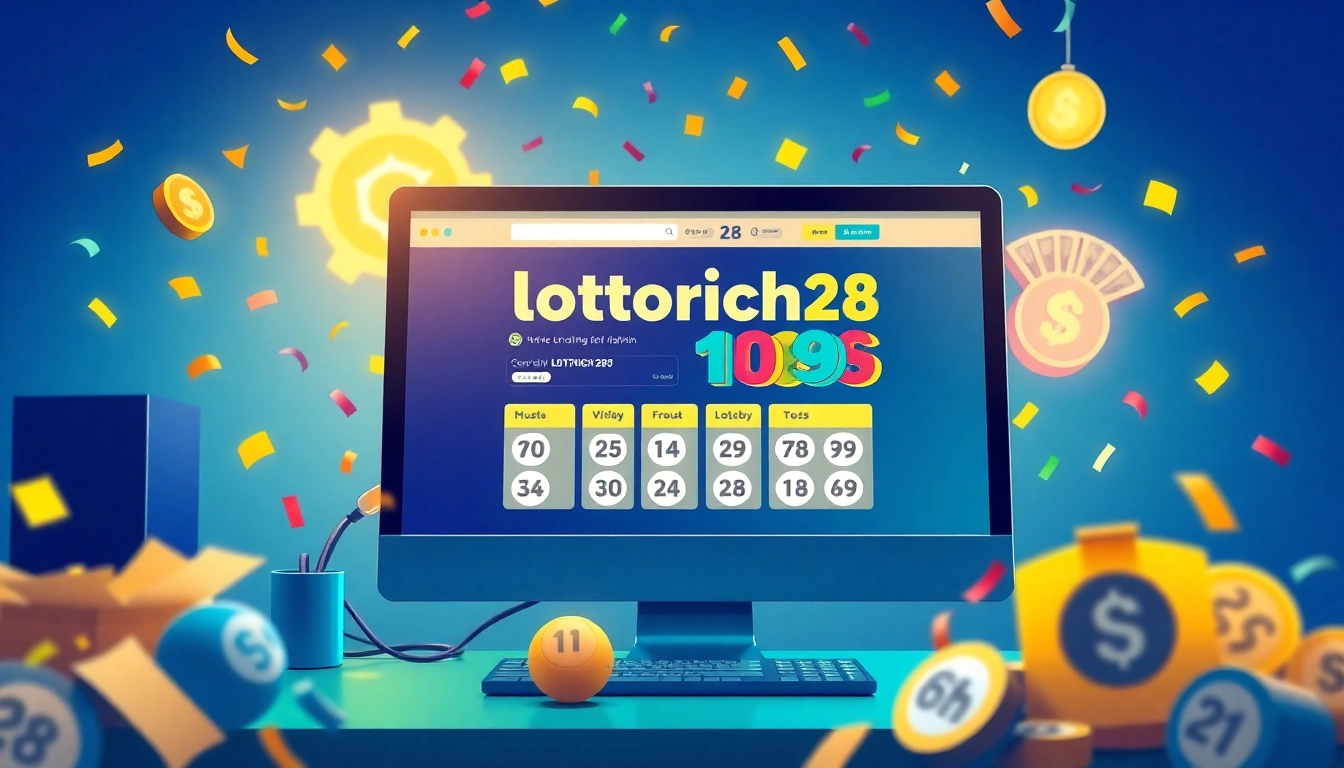Understanding the Basics of the Lottery
What is a Lottery and How Does it Work?
The lottery is a game of chance, where players purchase tickets for a chance to win cash prizes based on a random drawing of numbers. The concept of lotteries dates back centuries, with roots in ancient civilizations, where they were used for various purposes such as funding public projects or determining land ownership. In modern times, lotteries are popular across many states in the U.S., offering players the excitement of potentially life-changing jackpots.
Essentially, a lottery operates by selling tickets, each with a unique combination of numbers. Players select their numbers or allow the system to generate them randomly for a game. The draws occur at scheduled intervals, and the winning numbers are announced. If a player’s ticket matches the drawn numbers, they win a prize that can range from a small cash sum to a life-altering jackpot. To learn more about various lottery options, lottery enthusiasts can explore different games available in their states.
Types of Lottery Games Available
The lottery landscape encompasses various formats, each attracting different types of players. Here are some popular categories:
- Draw Games: These involve choosing numbers before a drawing, where predetermined winning combinations are selected. Popular examples include Powerball and Mega Millions, which feature large jackpots and multiple jackpot tiers.
- Instant Games: Often referred to as “scratch-offs,” these tickets offer immediate results. Players scratch off a coating to reveal if they have won a prize. Instant games tend to have lower jackpots but are popular for their quick feedback and variety.
- Daily Games: These games offer more frequent chances to win, often drawing once or twice a day. They typically have smaller jackpots but can still provide significant payouts.
- Raffles: Participants buy raffle tickets with the hope of winning fixed prizes. Unlike traditional lotteries, the number of tickets sold is predetermined, making the odds easier to understand.
Common Myths About the Lottery Explained
Despite the excitement surrounding the lottery, many misconceptions persist. Here are some of the most common myths dispelled:
- Myth 1: The Lottery is a Scam: While it’s true that some illegitimate schemes exist, state-run lotteries are heavily regulated and provide transparency in their operations.
- Myth 2: You Can Predict Winning Numbers: Lottery draws are random, making the prediction of winning numbers impossible, as there are no discernible patterns.
- Myth 3: Only Poor People Play the Lottery: Players come from all demographic backgrounds, and lottery participation does not correlate directly with economic status.
- Myth 4: Winning Means Instant Happiness: While winning can bring temporary joy, many winners face challenges in managing their newfound wealth, leading to stress and even financial difficulties.
Strategies for Increasing Your Lottery Odds
Analyzing Winning Numbers: Is There a Pattern?
The allure of lottery games often leads players to analyze previous drawings in the hope of finding patterns. While draws are random, some players choose to look at frequency charts of past winning numbers or hot and cold numbers to inform their choices. Though this strategy has its skeptics, it remains popular among enthusiasts.
It’s important to note that while understanding past outcomes can be engaging, it does not significantly improve the odds, as every drawing is independent. However, players may find comfort in having a systematic approach, choosing numbers based on statistical frequency rather than relying solely on intuition.
Choosing the Right Lottery Games for Better Chances
Different lottery games have different odds, making it crucial for players to choose wisely. Games like Powerball and Mega Millions boast multi-million dollar jackpots but involve significantly lower odds of winning compared to local lotteries. As a general rule, state lotteries with smaller jackpots typically offer better odds, making them more accessible for players looking to win. Researching the odds of various games can help players choose games that align with their preferences for risk and reward.
Pooling Resources: How Lottery Syndicates Work
Joining a lottery syndicate can be an effective way to enhance chances of winning. By pooling resources, groups of players can buy more tickets and participate in multiple drawings, which increases the chances of securing a win. Syndicates can be formed among friends, coworkers, or family members. The collective pooling of funds allows for greater ticket diversity without significant financial burdens on individuals.
However, participants should clearly define rules regarding winnings distribution, ticket checks, and confirmations to avoid conflicts. Trust is essential, so it’s advisable to establish written agreements among syndicate members for transparency.
The Psychology of Lottery Play
Why People Play the Lottery: Motivation and Behavior
Understanding the psychological factors that drive lottery participation is essential for players and marketers alike. Many individuals view the lottery as an escape from their financial obligations or a chance for a better future. A critical factor is the thrill associated with the possibility of winning enormous sums of money, which can tap into a person’s desires for financial security and prestige.
Furthermore, societal influences contribute to lottery behaviors. Stories of winners being featured on media platforms often fuel fascination and participation, creating a psychological cycle that compels more players to buy tickets. The excitement also arises from the social aspect, with individuals feeling a sense of camaraderie when discussing or participating in lotteries with others.
Managing Expectations: Understanding Your Odds
One of the most significant psychological aspects of lottery play is managing expectations. Many players have unrealistic views about their chances of winning, often underestimating the actual odds against them. For instance, winning the Powerball jackpot has approximately a 1 in 292.2 million chance. This deep understanding of odds can prevent disappointment and help players view the lottery experience as entertainment rather than a financial strategy.
Educating players about true odds can lead to healthier lottery habits and expectations, allowing them to enjoy the thrill of the game without falling into the trap of investing beyond their means seeking a life-changing windfall.
Common Emotional Pitfalls When Playing the Lottery
The emotional highs and lows of lottery play can impact individual decision-making processes. The hope and anticipation before a drawing can lead to euphoric feelings, while losing streaks can stem frustration or even lead to gambling addiction. Players can also experience regret over strategies not taken, leading to emotional turmoil.
Developing healthy lottery habits includes setting limits on spending, treating ticket purchases as entertainment expenses, and understanding that regular participation does not guarantee winning. Recognizing these emotional triggers empowers players to enjoy the experience without compromising their financial well-being.
State Regulations and Legal Considerations for Lottery Players
Understanding the Legal Framework of the Lottery
Lotteries are regulated by state governments in the U.S., and each state has its own set of laws and regulations governing their operation. Players must be aware of the legal requirements, including age restrictions (often 18 years old in most states) and residency rules. Some states allow online ticket purchases, while others do not, impacting how players access lottery games.
Additionally, understanding the integrity of the games is critical for players. Legitimacy can often be verified through official state lottery websites, ensuring that players participate only in authorized and regulated lottery systems. Regularly reviewing local laws and staying informed through state announcements can help players navigate the legal landscape.
Taxes on Lottery Winnings: What You Need to Know
A significant consideration for winners is the taxation of lottery winnings. In the U.S., lottery winnings are subject to federal income tax, and many states impose their taxes as well. Depending on the size of the winnings, state tax laws can significantly reduce the total amount a winner receives.
Winners should consult with financial advisors to understand their tax obligations fully and explore strategies for mitigating tax liabilities. Options include setting aside portions for tax payments, considering annuity payouts versus lump sums, and discussing charitable contributions, which can offer additional tax benefits.
How to Verify the Legitimacy of a Lottery
With many lottery scams online, it’s essential for players to know how to verify a lottery’s legitimacy. Authentic lotteries will have clear details about the game, including how to enter, drawing dates, odds, and where to claim prizes. Players should also look for information on the organization or commission that oversees the lottery and ensure it complies with local laws and regulations.
Players can reach out directly to the applicable state lottery commission if they suspect a scam or have questions. This proactive approach protects players from deceptive practices and ensures that they engage with legitimate lotteries only.
Planning for Your Future After Winning the Lottery
Steps to Take Immediately After Winning a Lottery
Winning a significant lottery prize can be overwhelming, and it’s crucial to have a plan in place. First, winners should secure their ticket in a safe place and sign the back to establish ownership. Next, consulting with legal and financial advisers can provide insights into managing newfound wealth responsibly.
It’s also wise to avoid public announcements, especially until decisions have been made about financial management and taxes. This strategy helps winners maintain privacy while they evaluate their options. Establishing an emergency fund and addressing immediate debts can set a solid foundation for long-term financial health.
Investing Your Lottery Winnings Wisely
Many lottery winners dream of luxurious futures, but prudent investment is key to ensuring long-lasting wealth. Consider diversifying investments in stocks, bonds, real estate, or other asset classes to establish sustainable income streams. Working with financial planners who specialize in wealth management can help winners navigate investment opportunities effectively.
Additionally, exploring philanthropic avenues can be meaningful, allowing winners to give back to their communities while deriving positive recognition. Setting goals for charitable contributions can add purpose to newfound wealth.
Common Mistakes Lottery Winners Make
The excitement of winning can lead to common pitfalls. Overspending on extravagant items, neglecting financial planning, and allowing emotions to guide decisions can jeopardize long-term wealth. Winners should create a structured plan for budgeting and savings, while also leaving room for enjoyment without overindulgence.
Furthermore, many winners fail to account for the long-term impact of taxes and financial obligations. Regular consultations with advisors can help mitigate these This is related to test risks and keep winners on a stable financial path.














Leave a Reply